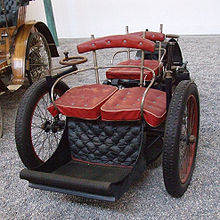Tricar


Tricar is a type of automobile from the early days of the automobile. Tricar and the similar but four-wheeled quadricycle are subspecies of the forecar .
Construction
Tricars were derived from motorcycles . The rear of the vehicle was that of a motorcycle, including the motorcycle frame, saddle for the driver and engine. The vehicles only had one rear wheel. There was a seat for one passenger in front of the handlebars. This seat was often placed between the two front wheels and therefore particularly low. The passenger was, so to speak, a windbreak and bumper. There were also commercial vehicles that had a cargo bed instead of the front seat. Many motorcycles could be converted into tricars by replacing the front wheel with a push-in car.
construction time
Léon Bollée constructed his first Tricar in 1895; he called this Voiturette and had the name protected. Nevertheless, the name developed into a vehicle category; early voiturettes are largely defined by weight and can therefore be three or four-wheeled.
Other manufacturers followed. As early as 1901, light, four-wheeled small cars that offered space for two people next to each other on a bench became popular. Motorcycles, which could optionally be equipped with sidecars as a motorcycle team , replaced the Tricars. After 1910 this type of construction almost completely disappeared from the market. However, Monet et Goyon made the Tri-Monet model until 1941.
Manufacturer of tricars
Most of the tricars were made in England and France . Advance , Ariel , Century , Contal , De Dion-Bouton , Griffon , Humber , Lagonda , Léon Bollée , Rex , Riley , Waddington and Werner manufactured tricars, among others . German manufacturers included Adler , Brennabor , Diamant , Dürkopp , Göricke , Magnet , NSU , Patria , Progress , Victoria and Wanderer . Also Waltham from the United States produced such vehicles.
literature
- David Burgess-Wise (editor): London to Brighton Veteran Car Run 1996. TRMG, High Barnet 1996, p. 40 (English).
Web links
Individual evidence
- ^ A b David Burgess-Wise (editor): London to Brighton Veteran Car Run 1996. TRMG, High Barnet 1996, p. 40 (English).
- ↑ a b Harald H. Linz, Halwart Schrader : The International Automobile Encyclopedia . United Soft Media Verlag, Munich 2008, ISBN 978-3-8032-9876-8 .
- ^ Monet et Goyon (French, accessed July 14, 2012)
- ↑ Michael Wolff Metternich : 100 years on 3 wheels. German three-lane vehicles through the ages. Neue Kunst Verlag, Munich, ISBN 3-929956-00-4 .
